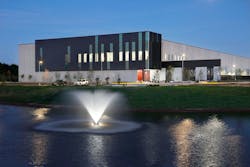Equinix Puts Down $25M In Data Center Nuclear Power Deal with Sam Altman's Oklo
Perceptions of the palpable convergence of the nuclear energy and data center industries were already running high this quarter after news of Amazon's purchase last month of a 900 megawatt (MW)+ nuclear energy data center campus in Pennsylvania.
Now a month later comes word that Equinix wants to purchase hundreds of megawatts of power from Oklo, the California-based nuclear fission startup backed by OpenAI founder and CEO Sam Altman, which aims to manufacture small modular reactor (SMR) technology for data center and industrial energy generation.
Oklo's stated mission is "to provide clean, reliable, affordable energy on a global scale through the design and deployment of next-generation fast reactor technology." The company adds that it is pursuing an owner-operator model with an intention to sell power directly to customers under long-term contracts, providing a source of recurring revenue.
Oklo expects its SMRs to generate up to 15 MW of power, while operating for more than a decade without refueling. While the nascent collaboration with Equinix is still at the letter-of-intent stage, the data center company has apparently already put up $25 million in the deal.
As gleaned from reporting in Datacenter Dynamics, to bring power to its U.S. data centers, colocation pioneer Equinix (who is also the world's foremost data center REIT) has pre-paid that $25 million to purchase between 100 - 500 MW of energy from Oklo’s planned generation facilities.
(There's no word at present on where the Oklo reactors would be located, nor of the data center locations they would presumably power.)
The deal with Equinix came to light in a disclosure filed recently by AltC with the Securities and Exchange Commission (SEC), which reveals that Equinix this February signed a letter of intent to purchase power from the SMR manufacturer.
SPAC to the Future
Bloomberg News notes how Oklo is currently undergoing a merger with special purpose aquisition company (SPAC) AltC Acquisition Corp., as established by OpenAI's Altman. The Oklo-AltC merger holds Oklo at $850 million valuation while providing it with $500 million in capital.
A SPAC is an investment vehicle that goes public and raises capital from investors for the purpose of acquiring a private company. The merger between Oklo and AltC is expected to close in July.
BISNOW noted that anticipation over the deal has inflated the SPAC’s share price almost 60% over the past month.
Oklo is backed by leading technology and decarbonization investors, including Altman, who has served as the company's Chairman since 2015. Altman is also the co-founder and CEO of AltC.
Co-founded in July 2021 to combine the technology thought leadership and deep industry relationships of Altman with the public markets expertise of Churchill Capital, AltC was formed to provide public investors access to a compelling “hard tech” opportunity.
Nuclear Nuances
Data center industry watchers can see why global operators such as Equinix and AWS are making "power moves" in the area of nuclear energy. Many in the industry believe that nuclear generation will inevitably play a key role in making the math make sense when it comes to powering the data centers of future.
The big question for the data center industry is how can the move to nuclear energy happen faster, beyond the conventionally stated temporal cushion of eight to ten years.
Meanwhile, NuScale Power, once the putative hope for data center SMR nuclear generation based on its relationship with U.S. federal regulators, appears to be moving the opposite of "faster."
The company has apparently become no less embattled since its cascade of laundry-airing moments last year, as its well-publicized deal with crypto data center entity Standard Power fell through.
According to Seeking Alpha, present red flags for NuScale include "an unclear timeline, competition, and a CEO who sold all his shares."
NuScale (and Other Green) Nuances
As further reported by the investment industry website's Manuel Paul Dipold, "NuScale's cash reserves are low, and the company will need new liquidity soon, while the CEO's sale of all his shares raises concerns."
As noted by a recent article from MIT Technology Review cited by Seeking Alpha's Dipold, the NuScale design for a reactor module that generates 50 MW of electricity had already been certified by the Nuclear Regulatory Commission (NRC).
However, as Dipold points out:
But during the certification process, NuScale´s engineers changed the design again so that in the future a module will produce 77 MW instead of 50 MW [...] So the company changed course. For its first power plant, which will be built at the Idaho National Laboratory, NuScale is planning to package six of the higher-capacity reactors together, making the plant capacity 462 MW in total. The upgraded power rating requires some adjustments, but the module design is fundamentally the same. Still, it means that the company needed to resubmit updated plans to the NRC, which it did last month...
It could take up to two years before the altered plans are approved by the agency and the company can move on to site approval, said Jose Reyes, Co-Founder and Chief Technology Officer at NuScale.
Meanwhile in the case of AWS, the company's global travails with data center powering in locations that have arguably become overripe both with facilities and the degree of public enthusiasm for them - such as Ireland - must have made the prospect of "bring your own [nuclear] power," as in Pennsylvania, that much more attractive.
About the Author
Matt Vincent
A B2B technology journalist and editor with more than two decades of experience, Matt Vincent is Editor in Chief of Data Center Frontier.



